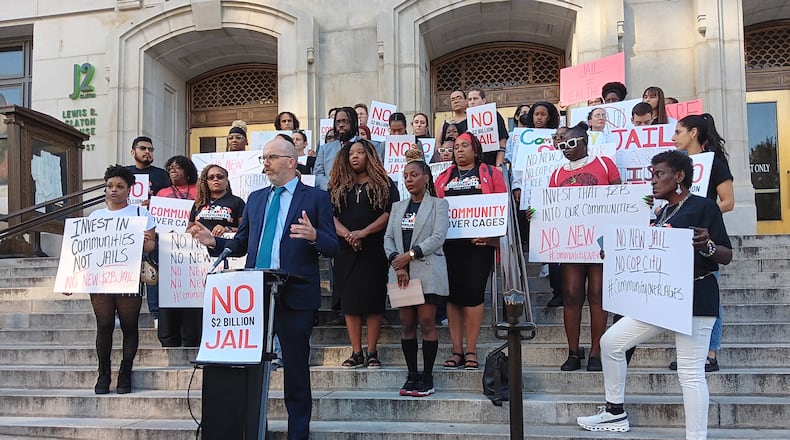Fulton County officials should seriously study renovating its current jail instead of building a new one, while reducing overcrowding by releasing more people and arresting fewer, an alliance of interest groups said Wednesday.
The group made its position known at a time when the Fulton County Commission is at a loss for how to proceed with funding the $1.7 billion new jail, after state legislators showed disinterest in authorizing a sales tax that could be used to cover construction costs. Commissioners are split on the issue, with some favoring building new and some in favor of renovation.
The Communities Over Cages coalition cited a study it commissioned from the Massachusetts-based Prison Policy Institute, critiquing last year’s county-funded study that endorsed a new jail from consultants STV Architects and TreanorHL.
About 40 people rallied Wednesday morning on the steps of the Fulton County Courthouse, across Pryor Street from the county Government Center. Many held signs opposing construction of a new and larger Fulton County Jail.
Spending on a new jail will take needed resources away from community mental health services, said Michael Collins from Color Of Change. The annual operating cost for the new jail’s greatly enlarged mental health area is estimated to be $63 million, more than three times what the county puts into community mental health care each year, Collins said.
The Prison Policy Institute report opposes pretrial incarceration in many instances, argues that spending on a new jail would detract from community mental health needs, and says a 2023 grand jury report estimated the cost of renovating the current Rice Street jail at 1.9% of a new jail’s cost.
Collins had harsh words for Sheriff Patrick Labat, who he said consultants relied upon for many of their assertions.
“Sheriff Patrick Labat is a thoroughly corrupt individual,” Collins said, citing his gradually-disclosed contracts with inmate monitoring firm Talitrix, donations to Labat’s reelection campaign by that company’s executives, and the uproar over what Labat acknowledged was inappropriate spending from the jail’s Inmate Welfare Fund.
Asked for a response to Wednesday’s statements, Labat’s office sent a statement Wednesday afternoon.
“We stand by the findings of the jail feasibility study commissioned and funded by the Fulton County Board of Commissioners: the Rice Street Jail needs to be replaced. The decades-long challenges plaguing the jail are worsening day by day,” it said. “Unfortunately, jails have become some of the largest mental health facilities in the country.
“A replacement jail will allow us to provide for over 400 detainees with mental health needs, rather than the maximum of 34 at our current facility.”
Devin Franklin, from the Southern Center for Human Rights, said he was a Fulton County public defender for 12 years. He thinks the best solutions will stem from reduced incarceration, not more investment in jails.
The ACLU of Georgia has previously offered four proposals to reduce jail crowding: Better use of policing alternatives and diversion; indicting arrestees within 90 days; determining people’s ability to pay bond; citing and releasing misdemeanor offenders.
Two former Fulton County inmates, now affiliated with Women On The Rise, spoke about jail conditions.
Veronica Brown said she was badly burned by an exploding faucet, but went without medical care for 23 hours. Her experience points to a general lack of care, supervision and resources at the jail, not a need for a new building, Brown said.
Alexandria Seely said the jail has a “shocking lack of access” to care for anyone with a mental health issue. The core problem is the inability of staff to manage the number of inmates, meaning the jail population should be reduced and the emphasis shifted to rehabilitation and support, she said.
Commissioner Bob Ellis said he didn’t agree with everything the coalition said, but much of it reinforced things he has discussed.
“The common ground is this: There’s not a pathway forward to building a $2 billion facility,” he said, adding there should be a study on the cost of refurbishing the current jail, and financial analysis of financing without raising property tax rates.
Commissioner Dana Barrett, who unsuccessfully proposed a resolution last week to urge some decision on the jail, said her main concern is the well-being of those in county care. Barrett said commissioners have to take responsibility for the jail’s deterioration and for underfunding the justice system and alternatives.
Commission Chair Robb Pitts has consistently urged renovation of the current jail, and expressed his “delight” at commissioners’ recent decision to halt planning for a new jail.
“No one believes that the status quo of the Fulton County jail is acceptable,” Pitts said. “But I for one do not believe this is a problem that can be solved through dollars alone.”
About the Author
Keep Reading
The Latest
Featured



